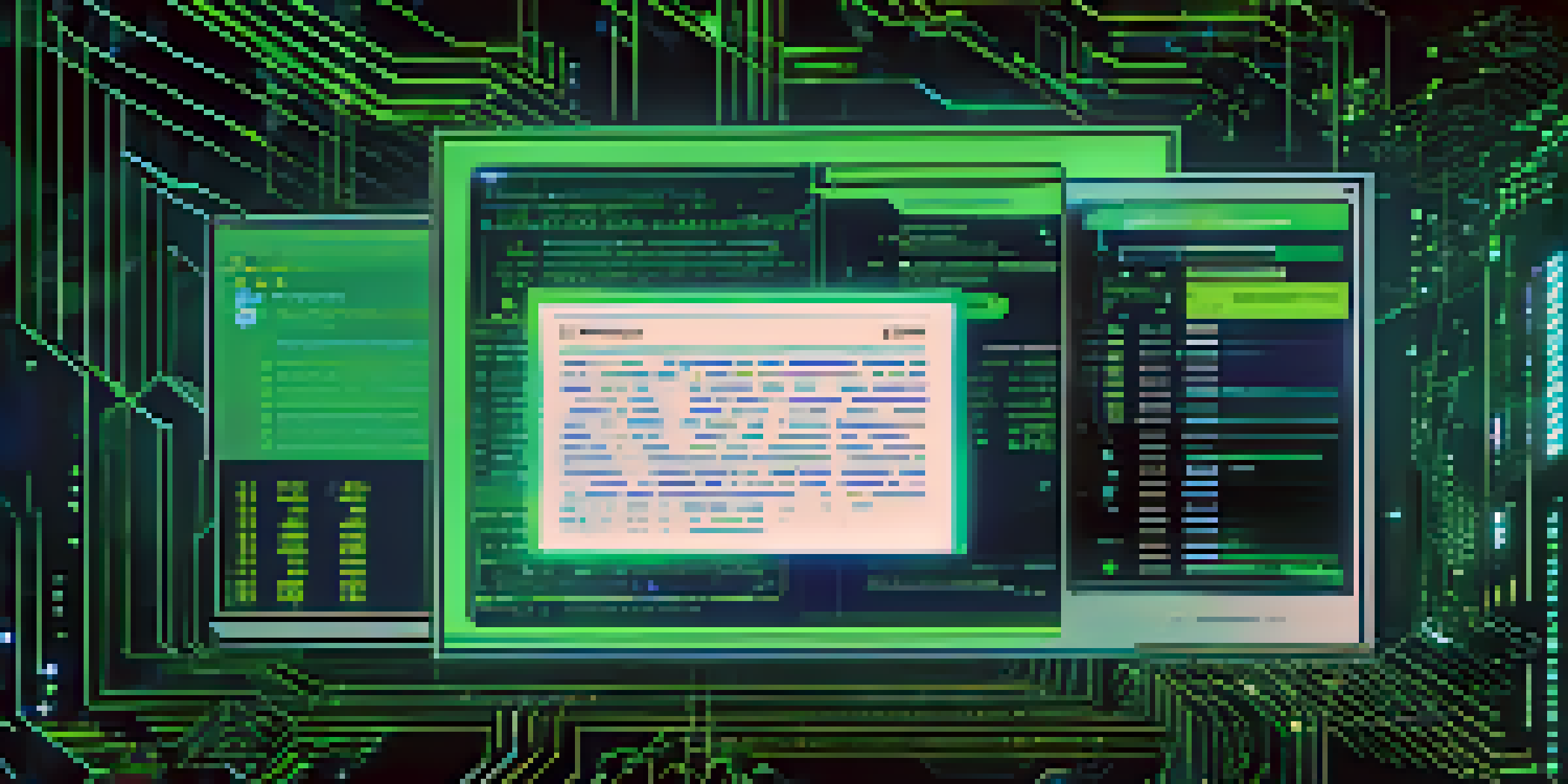Intellectual Property Rights and NFTs: Key Legal Insights

What Are Intellectual Property Rights (IPR)?
Intellectual Property Rights (IPR) are legal rights that protect creations of the mind, including inventions, literary and artistic works, designs, symbols, names, and images used in commerce. They're essential for encouraging innovation and creativity by providing creators with exclusive rights to their work. Without these rights, artists and inventors might struggle to gain recognition or financial reward for their efforts.
Intellectual property is the oil of the 21st century.
In the digital age, IPR becomes increasingly complex, especially with the rise of technologies like blockchain and NFTs. These rights help ensure that the original creators maintain control over how their work is used and distributed, which is crucial in the rapidly evolving online landscape. For instance, when someone creates a digital artwork, IPR allows them to monetize it or restrict its usage.
Understanding IPR is crucial for anyone involved in the creation or trading of NFTs, as it lays the groundwork for ownership, usage rights, and potential legal disputes. By grasping these concepts, creators and collectors can navigate the NFT marketplace more effectively and safeguard their interests.
How NFTs Interact with Intellectual Property Rights
NFTs, or Non-Fungible Tokens, are unique digital assets that represent ownership of a specific item, often linked to digital art, music, or collectibles. While purchasing an NFT gives you ownership of a digital token, it does not automatically grant you the underlying intellectual property rights of the content it represents. This distinction is vital to understand for both buyers and sellers in the NFT space.

For example, if an artist sells an NFT of their artwork, the buyer typically gets ownership of the NFT itself but may not receive the copyright to reproduce or sell the image. The original artist retains those rights unless explicitly transferred. This situation can lead to confusion, highlighting the importance of clear agreements when trading NFTs.
Understanding IPR is Crucial
Grasping intellectual property rights is essential for creators and collectors in the NFT space to safeguard their interests and navigate ownership complexities.
In essence, the ownership of an NFT and the ownership of the intellectual property it represents can be separate matters. Understanding this relationship helps prevent potential legal issues and ensures that all parties are aware of their rights and obligations.
The Importance of Licensing in NFT Transactions
Licensing is a critical aspect of navigating intellectual property in the NFT market. When creators mint NFTs, they should consider how they want to license their work, which specifies how buyers can use the content associated with the token. This can include restrictions on reproduction, distribution, or commercial use, ensuring that creators can protect their rights.
In the digital age, intellectual property rights are more important than ever, as they protect the very essence of creativity and innovation.
For instance, an artist might allow a buyer to display their artwork but prohibit them from using it for merchandise or commercial purposes without additional licensing agreements. These licensing terms should be clearly communicated to avoid misunderstandings between creators and buyers. Creating a straightforward licensing agreement can enhance the value of the NFT and clarify what the buyer can and cannot do.
In short, licensing serves as a bridge between the ownership of the NFT and the rights associated with the underlying intellectual property. Ensuring that both creators and buyers understand these terms is essential for a healthy and transparent NFT marketplace.
Potential Legal Issues with NFTs and IPR
As the NFT market continues to grow, so do the potential legal issues surrounding intellectual property rights. One common concern is copyright infringement, where someone mints an NFT using a piece of art or music they do not own without permission. This not only violates the creator's rights but can also expose the offender to legal action.
Another issue is the question of authenticity and ownership. If someone buys an NFT but the underlying work was created without the proper rights, they may find themselves in a precarious legal situation. This underscores the necessity for thorough due diligence before making a purchase or minting an NFT, ensuring all rights are respected.
Licensing Clarifies NFT Use
Clear licensing agreements are vital in NFT transactions, ensuring creators retain their rights while buyers understand how they can use the associated content.
Moreover, as legal frameworks around NFTs and IPR continue to evolve, staying informed about changes in laws and regulations is crucial. Creators and investors must remain vigilant to avoid potential pitfalls and ensure they are operating within legal boundaries.
The Role of Smart Contracts in NFT Transactions
Smart contracts are self-executing contracts with the terms of the agreement directly written into code. They play a pivotal role in the NFT space by automating transactions and ensuring that the terms of an agreement are executed without the need for intermediaries. This technology can help streamline the process and provide additional security for both creators and buyers.
For instance, a smart contract can enforce licensing terms automatically, ensuring that creators receive royalties each time their NFT is sold in the secondary market. This feature not only benefits artists but also incentivizes them to create more work knowing they will continue to earn from their creations. It represents a significant shift in how artists can monetize their work in the digital realm.
Overall, smart contracts enhance transparency and trust in NFT transactions, making it easier to navigate the complexities of intellectual property rights. They can help mitigate some of the legal issues associated with NFTs by ensuring clear terms are adhered to throughout the transaction process.
Future Trends in Intellectual Property and NFTs
As the NFT market matures, we can expect to see significant developments in how intellectual property rights are handled. One trend is the increasing adoption of standardized licensing agreements, which could simplify the legal landscape for creators and buyers. By having clear and consistent terms, participants can engage more confidently in NFT transactions.
Another potential trend is the rise of platforms that provide legal resources and support for NFT creators. These platforms could help artists navigate the complexities of intellectual property, ensuring they understand their rights and responsibilities. This would empower creators and promote a more ethical and sustainable NFT ecosystem.
Legal Issues in NFT Market
As the NFT market evolves, potential legal challenges, including copyright infringement and authenticity concerns, highlight the need for due diligence and awareness.
Finally, as lawmakers and regulators catch up with the technological advancements of NFTs, we may see clearer legal frameworks emerge. This could lead to more robust protections for intellectual property rights within the NFT space, benefiting both creators and collectors alike.
Conclusion: Navigating IPR in the NFT Marketplace
Navigating the intersection of intellectual property rights and NFTs can be challenging but is essential for anyone involved in this burgeoning market. Understanding the nuances of ownership, licensing, and potential legal issues will empower creators and collectors to make informed decisions. The NFT landscape is still evolving, and staying abreast of changes in IPR can help participants safeguard their investments and rights.
As technology and legal frameworks advance, the importance of clear communication and agreements will only grow. Engaging with legal professionals or resources can further enhance understanding and compliance, ensuring that all parties are protected. By taking the time to understand these critical aspects, creators can confidently share their work, and collectors can enjoy their purchases without worry.

In summary, intellectual property rights play a vital role in the NFT ecosystem. By respecting creators' rights and adhering to legal guidelines, we can collectively foster a vibrant and equitable marketplace that benefits everyone involved.